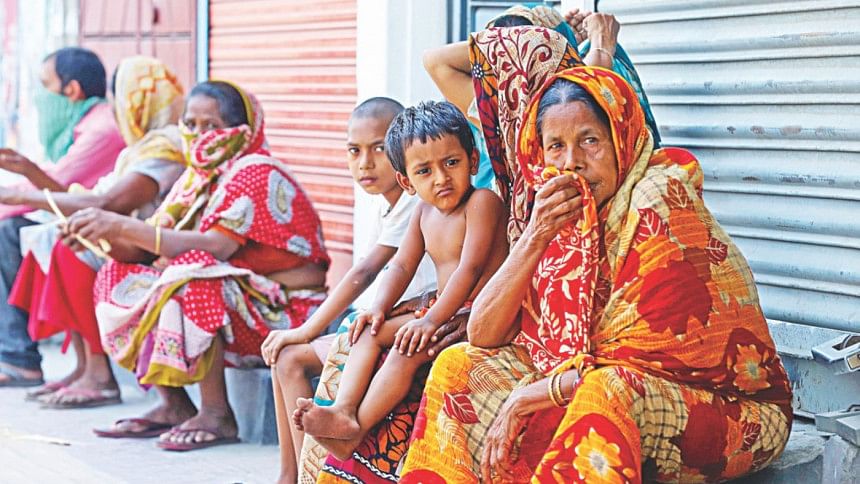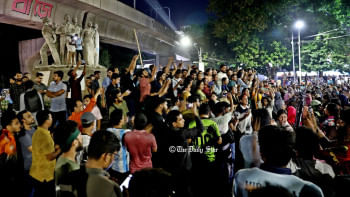Poverty during the pandemic: Three stories

In this time of the pandemic and the resultant economic slowdown, one has to be mindful of the effects of these twin curses on the poor of Bangladesh. The stimulus packages and direct economic relief can help somewhat, but these will bypass a sizeable chunk of the needy. I have been in touch with three families who live in three areas of Bangladesh—Dhaka, Sylhet and Jamalpur—to track the economic and health impacts of the disruptions during the last eight months. What my interactions with them reveal is that pre-existing health conditions and their lack of savings have adversely affected them and their ability to earn a living. One of them has become a dependent and the other two have come back to Dhaka, putting their future plans on hold until the pandemic recedes and true economic recovery takes place.
I, along with many others who have worked on poverty elimination, have voiced the need to support poor families during times of crises such as natural disasters, economic slowdowns and sickness of the principal bread-earner. With no safety net and zero net worth, a single crop failure or morbidity of the head of the household can push a family, which is inching its way up the income ladder, back to square one.
During the pandemic, the impacts on low-income earners in Bangladesh have been of concern from the beginning of the lockdown in March. The G-20 summit leaders this week acknowledged that the pandemic has had a far-reaching economic impact on developing countries, pushing millions into extreme poverty. Many have lost their jobs, and the pandemic has also adversely affected goals to eliminate hunger and improve health conditions.
It's not all hopeless though. There are voices of optimism who are working on new ways to break the cycle of poverty. Martin Ravaillion, an economist who had previously advised the World Bank, tweeted "End Poverty" to mark the 28th anniversary of the International Day for the Eradication of Poverty, celebrated on October 17 each year. The UN Geneva office was poetic when it tweeted on November 7, "All humans are born free and equal in dignity and rights". I must concede that Martin Ravaillion is a very imaginative person or shall we say, a dreamer. We can accept his proposal to "use ideas, data and analysis to help fight global poverty", but many like me consider that to "think that poverty might one day be gone" could be a little too audacious and out of touch with the harsh realities of the lives of our poor, today.
Coming back to the families who live near the poverty line, consider Anima, who has been working in Dhaka, taking care of an elderly person in an affluent neighbourhood. She has gone through many ups and downs since her birth in Barisal almost six decades ago. Her four daughters and one son have managed to hold their heads above water thanks to the RMG industry and the booming economy over the last 35 years. However, two of her daughters have been in and out of marriage and have depended on each other to eke out a subsistence living. They have no adequate resources for healthcare and every episode of illness has taken a toll on Anima and her daughters. She herself has a bad liver condition as well as high blood pressure. Her medicines cost Tk 2,100 per month, which she pays out of her salary, but one of her daughters has a serious illness for which she was divorced by her husband, who was unable to support her or defray the cost of her medical expenses.
Ashura, another middle-aged woman in my study group, is a model mother who got married early, after she moved to Dhaka from Mymensingh to make a living. Her husband died, leaving her with three young children, a boy and two girls, to raise on her own resources. They lived in one of the slums of Dhaka and she worked as a domestic help in Lalmatia, a middle-class suburb, and sent her children to study at madrasahs, paying for their education from her meagre income. Her daughters, as they were reaching puberty, were enrolled in a residential programme with a madrasah and received good educations. One of them, Urmi, is married and the other, Arifa, is a teacher at a madrasah.
However, Ashura herself is paying for her years of hard work and neglect of her health conditions, and suffers from serious diabetic conditions as well as a failing kidney. Although she managed to save a sizeable chunk from her salary while working abroad with a Bangladeshi diplomat in Bhutan and European countries, she has fallen victim to the greed of her relatives, who borrowed from her but failed to return the loan during her times of need. She was working in Dhaka with one of the families she has been associated with since her young age. Recently, once the lockdown began, she had to take early retirement after a brief period of hospitalisation with unpaid bills, and temporarily moved to Netrokona to be near her sister. Her daughters are very close to her, but they are unlikely to be able to support her medical treatment. Any serious episode of diabetic outburst or kidney failure might be catastrophic for her (after finishing this article, I was informed that Ashura sadly passed away on November 22 due to kidney failure).
The youngest of this group, Azim, has been in and out of different jobs since he moved to Dhaka from his birthplace in a small village in Golapganj thana, 20 miles from Sylhet municipality. He was born in a lower-middle-income family but the death of his father at an early age pushed all siblings, seven brothers and three sisters, into severe economic uncertainties, and they had to start fending for themselves. He received very little formal education but managed to learn how to read and perform simple arithmetic on his own. Azim, a young and energetic man who is now in his thirties, has tried his hand in the RMG sector, small-scale business, domestic work as well as rural entrepreneurship. He is able to pick up any trade, but poor luck and the fickleness of small business fortune has prevented him from getting out of the cycle of poverty and destitution. He is saving to launch his next business enterprise as a vendor in the bustling bazaar of Sylhet town, but he has to weigh his prospects of success given his limited capital. He says, "If nothing else works, I will become a caretaker for this family."
Dr Abdullah Shibli is an economist and senior research fellow at International Sustainable Development Institute (ISDI), a think-tank based in Boston, USA.

 For all latest news, follow The Daily Star's Google News channel.
For all latest news, follow The Daily Star's Google News channel. 



Comments